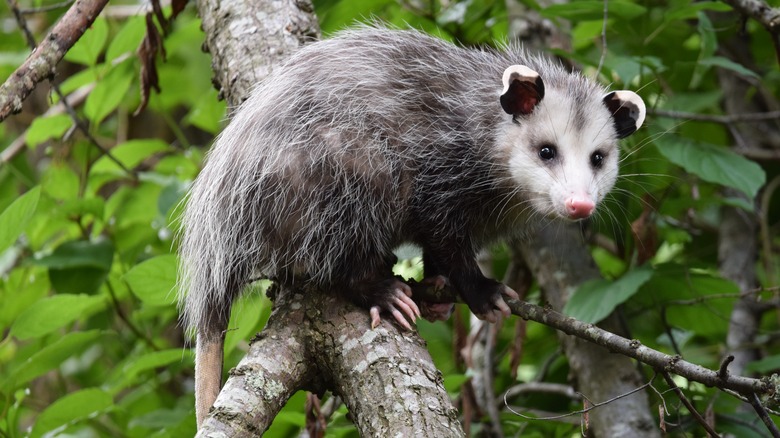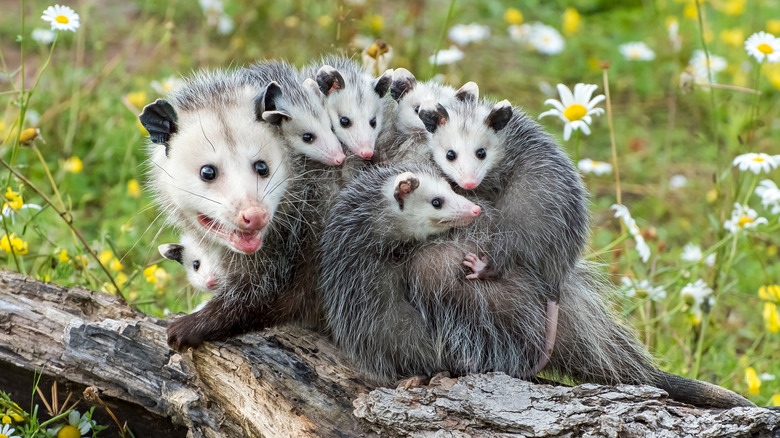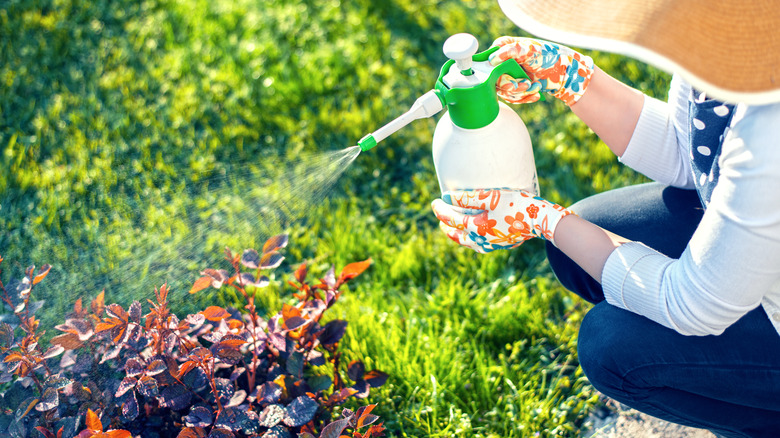Can Hot Sauce Really Keep Opossums Out Of Your Yard?
They might be cute, but if you're a gardener seeking a bountiful harvest or you want to protect your trees or house from nests, you don't want to see an opossum in your yard. You may be a little leery of chemical repellents, though. If you have children or pets on your property, you're environmentally conscious, or you're growing your own food, these are all excellent reasons to be uninterested in using conventional poisoning and pest control methods. The good news is there's a simple, humane, and safe solution to your opossum problem, and if you like your food spicy, you might already have it on hand in your kitchen. It's true: Hot sauce has been found to be effective at driving opossums away. If you want to keep your yard opossum-free, you might not need much more than some sriracha and a spray bottle, as Forbes explains.
Why is hot sauce such a great opossum repellent? Opossums have an exceptionally strong sense of smell. This trait lets them track their way into your vegetable garden, but it could also be exploited to get them out of your yard once and for all. The capsaicin in hot sauces can be overwhelming to a sensitive opossum nose, convincing them to leave your yard alone.
How to use hot sauce to get rid of opossums
As mentioned above, the secret weapon in your hot sauce is capsaicin — a chemical compound that is naturally present in the fruits of chili peppers and similar vegetables. Capsaicin is what creates the heat in hot sauce as it reacts with skin tissue to create a burning sensation. Anyone who has eaten a hot pepper can attest to this feeling, but capsaicin can also cause pain and discomfort if inhaled — just think about how effective pepper spray can be.
Don't worry, though: You don't need to put on a gas mask and pepper spray your whole yard to reap the benefits of capsaicin as an opossum repellent. You can create an entirely liquid solution that you can spray directly onto your plants to deter opossum infestation. The smell will be strong enough for the opossums, but not strong enough to cause any reactions in humans. Mix water with dish soap, which will prevent your solution from evaporating too quickly to be effective. Combine this mixture with hot sauce, cayenne pepper, or chili flakes, then add the liquid to a spray bottle and thoroughly douse the area you are hoping to keep opossums away from.
Some extra guidance on hot sauce in the garden
You may find the concept of hot sauce repellent appealing because it doesn't pose a risk of poisoning your children, pets, or plants in the ways that some chemical repellents might. While it's true that exposure to hot sauce and capsaicin won't cause serious health problems, that doesn't mean you should spray your mixture around willy-nilly as if it is no more harmless than water. There are definitely some considerations to take when using hot sauce repellent.
First, make sure you yourself are safe while you're applying it. Hot sauce and any capsaicin derivative can be exceptionally painful if it contacts the eye area, so make sure you're wearing goggles or safety glasses. It can be smart to wear gloves, too, just in case some residue gets on your hands and then you accidentally touch your eye. You will want to keep any children or pets away from your yard for the time period immediately after you spray, just to ensure they don't mistakenly ingest any super-spicy liquid while it's still drying on your plants.
In case you are worried about the risk to other non-opossum wildlife who may visit your yard, keep in mind most mammals can have adverse reactions to capsaicin almost the same way people can. According to the National Pesticide Information Center, capsaicin might cause coughing and temporary blindness in animals, but the smell should keep non-opossum critters at a distance. Meanwhile, capsaicin might be harmful for bees and other insects. And finally, while hot sauce spray will not impede plant growth, if your garden has fruits that you can eat straight off the vine, like tomatoes, make sure you don't spray the mixture directly onto the fruits ... unless, of course, you're planning to use those tomatoes to make a spicy salsa.


